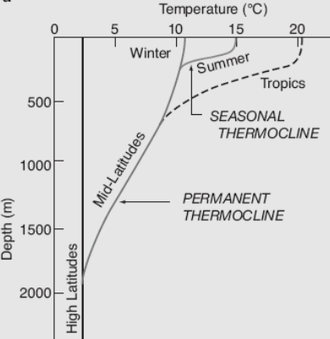Ocean temperature
Ocean temperature refers to the heat content of the ocean, which varies with location, depth, and season. Understanding ocean temperature is crucial for studying climate change, marine ecosystems, and weather patterns. The temperature of the ocean surface, known as surface temperature, can be significantly different from the temperatures deeper in the ocean.
Overview
The temperature of the ocean is a key factor in determining the climate and weather patterns of the Earth. The ocean absorbs solar radiation more efficiently than land, making it a critical component of the Earth's energy balance. The distribution of solar radiation across the planet leads to temperature variations, which are influenced by factors such as latitude, ocean currents, and the presence of ice.
Measurement
Ocean temperature is measured using a variety of tools and methods. Satellites provide surface temperature data across the globe, while buoys and ships collect in-situ measurements at various depths. Advanced technologies like Argo floats autonomously measure temperature (and salinity) from the surface down to 2000 meters, providing valuable data for understanding ocean dynamics.
Importance
The temperature of the ocean influences global climate patterns by affecting the atmosphere. Warm ocean waters fuel tropical cyclones and contribute to the evaporation process, affecting precipitation patterns worldwide. Additionally, ocean temperature affects marine life, with warmer temperatures leading to coral bleaching and affecting the distribution of fish species.
Ocean Currents and Climate
Ocean currents play a significant role in regulating the Earth's climate by redistributing heat from the equator towards the poles. The Gulf Stream, for example, is a warm ocean current that significantly warms the North Atlantic region, affecting weather and climate. Changes in ocean temperature can disrupt these currents, potentially leading to significant climate shifts.
Climate Change and Ocean Temperature
Climate change is causing ocean temperatures to rise, a phenomenon known as ocean warming. This warming has a range of impacts, including sea level rise due to thermal expansion, melting polar ice, and changes in marine ecosystems. Rising ocean temperatures are also linked to more intense and frequent extreme weather events.
Challenges and Future Directions
Monitoring and predicting changes in ocean temperature is a complex challenge due to the vastness and depth of the oceans. Future research and advancements in technology are essential for improving our understanding of ocean temperature dynamics and their implications for climate, weather, and marine ecosystems.
Transform your life with W8MD's budget GLP-1 injections from $125.
W8MD offers a medical weight loss program to lose weight in Philadelphia. Our physician-supervised medical weight loss provides:
- Most insurances accepted or discounted self-pay rates. We will obtain insurance prior authorizations if needed.
- Generic GLP1 weight loss injections from $125 for the starting dose.
- Also offer prescription weight loss medications including Phentermine, Qsymia, Diethylpropion, Contrave etc.
NYC weight loss doctor appointments
Start your NYC weight loss journey today at our NYC medical weight loss and Philadelphia medical weight loss clinics.
- Call 718-946-5500 to lose weight in NYC or for medical weight loss in Philadelphia 215-676-2334.
- Tags:NYC medical weight loss, Philadelphia lose weight Zepbound NYC, Budget GLP1 weight loss injections, Wegovy Philadelphia, Wegovy NYC, Philadelphia medical weight loss, Brookly weight loss and Wegovy NYC
|
WikiMD's Wellness Encyclopedia |
| Let Food Be Thy Medicine Medicine Thy Food - Hippocrates |
Medical Disclaimer: WikiMD is not a substitute for professional medical advice. The information on WikiMD is provided as an information resource only, may be incorrect, outdated or misleading, and is not to be used or relied on for any diagnostic or treatment purposes. Please consult your health care provider before making any healthcare decisions or for guidance about a specific medical condition. WikiMD expressly disclaims responsibility, and shall have no liability, for any damages, loss, injury, or liability whatsoever suffered as a result of your reliance on the information contained in this site. By visiting this site you agree to the foregoing terms and conditions, which may from time to time be changed or supplemented by WikiMD. If you do not agree to the foregoing terms and conditions, you should not enter or use this site. See full disclaimer.
Credits:Most images are courtesy of Wikimedia commons, and templates, categories Wikipedia, licensed under CC BY SA or similar.
Contributors: Prab R. Tumpati, MD


